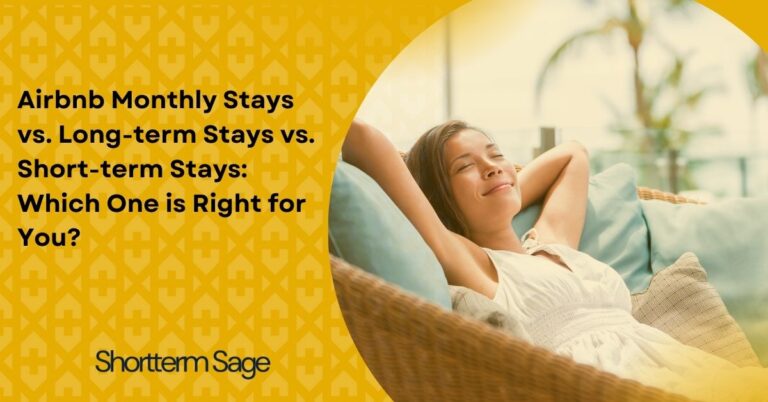
Hosting a short-term rental during a pandemic can be very challenging. Occupancies drop, prices fluctuate, and consumer behavior changes. We hosts need to adjust our marketing strategies carefully. From the duration of stays to the amenities we offer, we’ll need to accommodate Airbnb monthly stays, not just short and long-term bookings.
If you haven’t considered opening up your Airbnb for longer-term occupancies, now is the time to do so. During economic slowdowns, we constantly need to adapt and evolve.
Keeping in mind our location, the short-term rental rules in our area, and the type of market we’re catering to, our rental business may even flourish during the Covid-19 pandemic.
Let’s look at the different durations of Airbnb occupancies and see which ones can benefit us the most.
As we all know, one of the biggest advantages of doing short-term renting — 30 nights or less — is the higher income potential. We also have more control of our properties and are able to use them whenever we want. We can do regular cleaning, repairs, and even upgrades as the need arises. Many hosts report seeing less wear and tear on their properties when they rent only short-term.
The downside, of course, is the amount of time, effort, and money that need to go into managing them — turnovers, maintenance, re-stocking, and utility payments.
Depending on where your property is, you may have even had to deal with erratic bookings or a generally slow season every year. If that’s so with you, consider going for longer-term stays. It’s a great way to tide you over the slow months.

Because of Covid-19, monthly or longer-term stays have been on the rise since 2020. Airbnb says bookings of more than 28 nights were up by 50% in August 2020 compared to the previous year.
These are somewhere between short and long-term (60 days and more) stays, serving the need of workers that are in transit or on extended assignments. Airbnb monthly stays are being fuelled by the shift to remote work, online schooling, and people’s desire to relocate.
There are families wanting to escape cramped houses in the city to get outdoors and be closer to nature. There are work-from-home professionals seeking a quiet place to concentrate. There are traveling nurses and Covid patients needing to stay near hospitals. They’re all signing up for month-long stays.
There are also college students looking for a room while waiting for schools to fully reopen, interns moving to another city to work, and retirees seeking safe places to shelter or quarantine. They all prefer Airbnb monthly stays that don’t lock them into year-long leases.
According to the online travel platform, many of the places being booked for monthly stays are within driving distance of major cities. Small towns in Vermont, Maine, Montana, Colorado, Virginia, and New York are some of the fastest-growing locations for these medium-term bookings.
What’s in it for the hosts? For one, encouraging guests to book longer stays can help boost occupancy. It also reduces guest turnover and helps secure a predictable income. Who doesn’t need those?
In August 2020, Airbnb put in place tools to help hosts open up their listings to longer-term guests. They also launched a portal that’s dedicated solely to monthly bookings. Since then, more than 80% of hosts now accept longer-term stays, with half of them offering weekly or monthly discounts.

Can Airbnb be used for long-term rentals? You bet! Long stays are now a permanent feature on Airbnb.
In fact, in a recent report, Airbnb said 30% of bookings in 200 destinations around the world have been for long-term stays. They added that more than 100,000 guests have stayed continuously on Airbnb for at least three months in the past year.
These are bookings that last for six months or longer, and they’ve become a popular hosting alternative to bring in steady income.
Using your property for long-term rentals has its own set of advantages. There are fewer cleaning and administrative tasks, less need for communicating with guests, and generally less time, effort, and money required to manage the business.
Think about it. You won’t need to shoulder the utility bills and re-stock the supplies, but you get reliable and consistent income each month — even during off-peak season.
And because there’s less risk of wild parties taking place, your neighbors will have fewer reasons to be annoyed. Hopefully, they’ll even get to know your tenants and start treating them as friends and long-term neighbors.
Yes, you’d earn significantly more on short-term rentals; but those can be a challenge if Covid-related restrictions resume and bookings continue to be spotty in the long run.

To answer the above, you’ll have to ask yourself a few other questions:
Assuming you live in an area where there’s a mix of both long-term occupants and weekend travelers, and your county regulations allow both, why not get a combination of both monthly and long-term guests?
As mentioned earlier, we need to be flexible as we live through Covid-19. We do this by optimizing our business while minimizing risks. As such, we’ll have to accommodate longer stays.
If you’re not sure yet, do a test run. List your property under “Airbnb Monthly Stays” and see if you can get any inquiries or reservations. If you do, give it a go.
After a few months, compare your earnings with how much you made over the same period last year.
Our reviews are made by a team of experts before being written and come from real-world experience. Read our editorial process here.
Some of the links in this article may be affiliate links, which can provide compensation to us at no cost to you if you decide to purchase a paid plan. These are products we’ve personally used and stand behind. This site is not intended to provide financial advice. You can read our affiliate disclosure in our privacy policy.
About the author:
This website is operated and maintained by Short Term Sage LLC. Use of the website is governed by its Terms Of Service and Privacy Policy.
Short Term Sage LLC may link to content or refer to content and/or services created by or provided by third parties that are not affiliated with Short Term Sage LLC. Short Term Sage LLC is not responsible for such content and does not endorse or approve it.
We use cookies to help improve, promote and protect our services. By continuing to use this site, you agree to our privacy policy and terms of use.